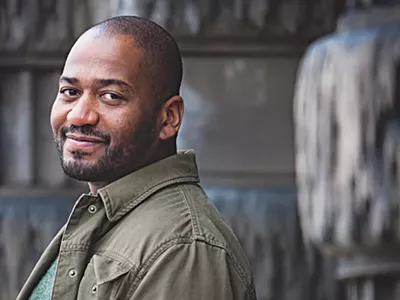
Audio By Carbonatix
[
{
"name": "GPT - Leaderboard - Inline - Content",
"component": "35519556",
"insertPoint": "5th",
"startingPoint": "3",
"requiredCountToDisplay": "3",
"maxInsertions": 100,
"adList": [
{
"adPreset": "LeaderboardInline"
}
]
}
]
Michigan's Supreme Court took the lawsuit filed by a woman raped by a deputy in the Wayne County Jail and used it to rewrite Michigan civil rights law, limiting its protection and assistance for victims.
Critics say the ruling vividly demonstrates how the court's renewed conservative majority is applying its political philosophies to cases they decide or, in some cases, re-decide as they reconsider cases from previous terms.
"There exist sharp differences of legal philosophy among the justices in matters involving individual rights and corporate rights and rights of the government," Justice Marilyn Kelly, part of the liberal minority, tells Metro Times.
The court's composition went from a 4-3 liberal majority at the end of last year to a 4-3 conservative court this term. It's showing in the decisions.
"This is a great example of how elections have consequences," says Kevin Gentry, who represented the Wayne County Jail rape victim in her civil case.
In that case, the court's conservatives said employers are not liable when their employees commit certain crimes — like the rape — when the illegal activity can't be foreseen or predicted.
Therefore, employers — whether in the private or public sectors — aren't responsible and can't be sued. Victims can't collect damages. The rape victim's case was thrown out instead of going to trial and a jury.
The decision overturns a 15-year-old case that had been guiding courts, re-interprets state civil rights law and weakens individuals' rights, while bolstering the ability of employers to avoid responsibility. Some court watchers consider that a hallmark of this court.
"As expressed ... in [the] dissent, the practical result of the majority's opinion is to dismantle the Michigan Civil Rights Act," says Kelly, one of the dissenters, in an e-mail to MT. "The majority's opinion in [this case] undermines the effectiveness of the Act."
The victim, a Livingston County woman, was taken to the Wayne County Jail on a probation violation in 2001. While there, contrary to jail policy that prohibited male employees from being alone with female prisoners, then-Deputy Reginald Johnson took her to a room that did not have video cameras and attacked her. He was convicted of second-degree criminal sexual conduct and served two years in prison.
The woman sued Johnson, partially using the sexual harassment provisions of Michigan civil rights law, and won a settlement. She also sued Wayne Country. A trial court judge dimissed her complaint before it could go to a jury, but the Michigan Court of Appeals in 2009 disagreed.
The county appealed, and in a 4-3 decision released July 29, the Michigan Supreme Court not only threw out the woman's case but also created a new legal standard for the state: Employers are not liable for the intentional criminal acts of employees like Johnson, because they cannot foresee such acts would occur, and cannot be sued by the victims.
"We are under no obligation to let stand an erroneous decision," reads the majority opinion, authored by former Chief Wayne County Judge Mary Beth Kelly, who was elected to the high court last year. "Permitting liability against defendants under these circumstances would impose too great a burden. ..."
The dissenters, Marilyn Kelly, Diane Hathaway and Michael Cavanagh, noted the majority's opinion may have the practical result of preventing sexual harassment victims from receiving any settlements.
"The majority's new test for ... sexual harassment cases creates a moving target that is impossible for plaintiffs to hit," the dissent says.
The decision has major impact for both businesses and governmental entities, which will be held less responsible — if responsible at all in civil cases — for the criminal actions of their employees. It also means individuals who suffer harm, such as sexual assault, have less recourse in the courts.
"I think the court came to the right conclusion," says Aaron Thomas, who litigated the case as assistant corporation counsel for Wayne County. "An employer is not responsible for the criminal acts of employees. ... Unless that employer has some type of prior knowledge that this person has some history of this type of offense, we can't hold an employer liable for what are by nature and definition unforeseeable acts."
The ruling is one of several this session that has civil rights advocates, environmentalists and employee rights attorneys outraged at what they say is the unconscionable politicization of the court.
In several 4-3 splits, the court's conservative majority has favored industry over environmental regulation, limited harmed and injured individuals' ability to collect damages or receive medical treatment and, in the Wayne Country Jail rape ruling, severely limited employers' accountability for the actions of their employees.
The conservative majority has also prevented public employees from making campaign contributions via payroll deductions, as is allowed in other workplaces. Other such politically charged subjects are on the court's agenda for the fall. The justices will consider challenges to Gov. Rick Snyder's tax policy and child support cases involving defendants being ordered to pay beyond their financial abilities. A lawsuit questioning the new emergency manager law is winding through the lower courts.
Some decisions, such as the campaign finance case and an environmental case involving permitting, were redecided this year, with the new conservative majority undoing decisions of the progressive majority that existed last term.
With every decision, civil rights advocates and the Michigan Democratic Party say they get more geared up for next year's election, when three of the seven seats on the high court will be contested. Up for re-election are conservative justices Stephen Markman, a former U.S. attorney nominated by President George Bush, and Brian Zahra, a former Wayne County judge who was appointed to the state Supreme Court by Gov. Rick Snyder in January.
In addition, the more liberal Justice Marilyn Kelly is retiring, and her seat will be hotly contested. The two major parties are currently researching candidates and thinking about how to mobilize voters.
"There's no question we're going to be using these cases next year," says Mark Brewer, the Michigan Democratic Party chairman. "These kinds of decisions are what give additional motivation to candidates. When they see these kinds of decisions, it angers them and upsets them, and people say, 'This has to change.'"
Technically Supreme Court races are nonpartisan, but nominees are chosen by the two major parties and receive financial backing from them. Parties are not indicated on the ballot, but incumbents are designated as such.
Elmer Roller, one of the jail victim's attorneys, says last week's decision in favor of employers is yet another example of how judicial politics can play out in the courtroom. When well-financed political players are elected, they are then beholden to the interests that helped them into office, the thinking goes.
And with campaign spending for state Supreme Court seats at record levels in 2010, he wonders about what qualities election winners have.
"We have politicians who are elected as opposed to academics, as opposed to scholars and imminently qualified people," Roller says. "It's taking a toll on individual civil rights, individual rights and liberties. It's a clear indication that individual rights, especially for women in the workplace, have been dramatically affected."
Roller will decide in the next few weeks whether to file in federal court, because he believes the Supreme Court's decision puts the interpretation of Michigan civil rights law at odds with federal statutes. "The argument would be, 'This is a blatant violation of the U.S. Constitution,'" he says.





